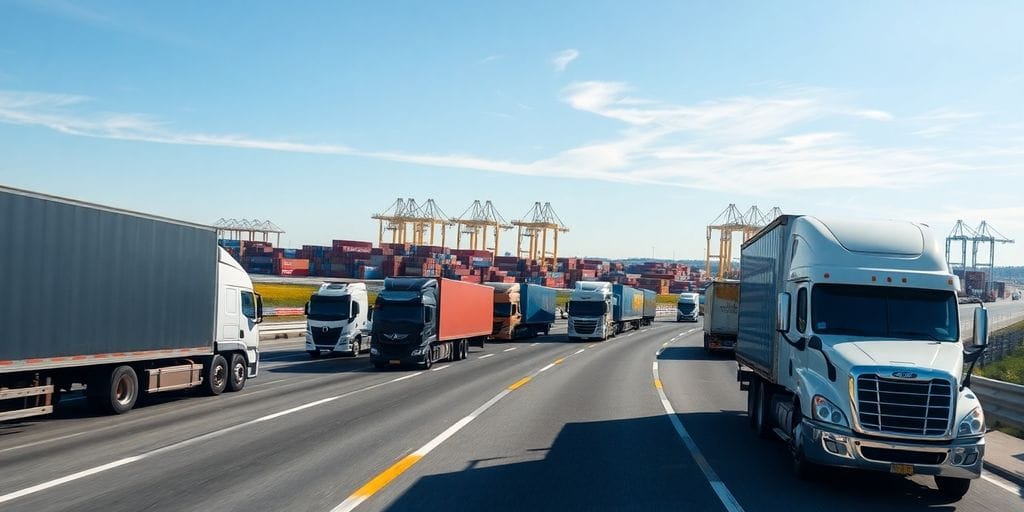Moving stuff from one place to another can be a real headache, especially when you’re dealing with big shipments. That’s where a freight broker comes in. Think of them as your go-between, helping you get your goods where they need to go without all the stress. This guide will walk you through what freight brokers do, why they’re useful, and how to pick a good one.
Key Takeaways
- A freight broker connects businesses that need to ship things with the people who can transport them.
- Working with a freight broker can save you money and make shipping easier because they know the market.
- Freight brokers are different from freight forwarders; brokers mostly arrange transport, while forwarders handle more of the physical stuff.
- When picking a freight broker, look for good communication, a solid reputation, and up-to-date tech.
- Even with a good freight broker, you might hit some bumps, but clear talking and good planning can help fix them.
Understanding the Role of a Freight Broker
Freight brokers are important in the world of shipping, but what do they actually do? It’s a fair question. Basically, they’re the people who connect businesses that need to ship stuff with the trucking companies that can move it. They don’t own trucks or warehouses; they’re more like matchmakers, making sure everything runs smoothly.
Connecting Shippers and Carriers
Freight brokers are the go-betweens. They link shippers needing transport with suitable carriers. Think of it like this: a company in Chicago needs to get a load of widgets to Los Angeles. Instead of calling dozens of trucking companies, they call a freight broker. The broker then finds a carrier with available capacity and the right equipment for the job. It saves the shipper a ton of time and effort. They make the shipping process easier.
Negotiating Rates and Routes
One of the biggest things freight brokers do is negotiate rates. They know the market, they know what carriers are charging, and they work to get the best possible price for their clients. They also help figure out the best routes to take, considering things like distance, traffic, and potential delays. It’s not just about finding a truck; it’s about finding the right truck at the right price, going the right way.
Ensuring Regulatory Compliance
Shipping isn’t just about moving boxes from point A to point B. There are rules and regulations that everyone needs to follow. Freight brokers stay up-to-date on these rules, making sure that both the shipper and the carrier are in compliance. This includes things like insurance requirements, safety regulations, and paperwork. It’s a big responsibility, but it helps prevent problems down the road.
Freight brokers play a vital role in the logistics industry. They simplify the shipping process for businesses, find reliable carriers, negotiate rates, and ensure compliance. By understanding their function, shippers can make informed decisions and optimize their supply chain operations.
Key Advantages of Partnering with a Freight Broker

Working with a freight broker can really change how you handle shipping. Instead of dealing with all the details yourself, you get someone to do it for you. It’s like having a logistics assistant, and it can make a big difference for your business.
Access to Extensive Carrier Networks
One of the biggest pluses is the access to a huge network of carriers. Freight brokers already have relationships with tons of different trucking companies, so you don’t have to spend time finding and vetting them yourself. This is especially helpful if you need to ship to different places or have specific requirements. It’s like having a Rolodex of trucking companies at your fingertips.
Cost Savings Through Expert Negotiation
Brokers are pros at getting good rates. They know the market, they know the carriers, and they know how to negotiate. This can save you a lot of money, especially if you’re not an expert in freight pricing. They can often get better deals than you could on your own. Think of it as having a professional negotiator on your side.
Streamlined Logistics Management
Freight brokers handle all the details of shipping, from finding a carrier to tracking the shipment. This frees you up to focus on other things, like running your business. It’s like outsourcing your logistics department, so you don’t have to worry about the day-to-day details. Plus, they often use technology to make things even easier. For example, a freight brokerage provider can use predictive analytics to optimize freight management.
Using a freight broker can really simplify your shipping process. They take care of the details, so you don’t have to. This can save you time, money, and a lot of headaches.
Here’s a quick look at some of the benefits:
- Reduced shipping costs
- Less time spent on logistics
- Access to a wider range of carriers
- Improved tracking and visibility
- Help with regulatory compliance
Distinguishing Freight Brokers from Freight Forwarders
It’s easy to mix up freight brokers and freight forwarders. Both help move goods, but they work in different ways. Think of it like this: one manages the whole process, while the other connects you to the right people. Knowing the difference can save you time and money.
Core Functions and Responsibilities
Freight forwarders are like travel agents for cargo. They handle everything from start to finish. This includes storage, packing, documentation, and choosing the best shipping method. They take care of all the details, so you don’t have to. Brokers, on the other hand, are more like matchmakers. They connect shippers with carriers. They don’t handle the goods themselves, but they negotiate rates and make sure everything runs smoothly. Freight brokers register for brokerage, while freight forwarders register as operators.
Handling of Goods and Documentation
Freight forwarders often physically handle the goods. They might pack them, store them in warehouses, and prepare them for shipping. They also take care of all the necessary paperwork, like customs forms and bills of lading. Brokers usually don’t touch the goods. Their job is to arrange the transportation and make sure all the paperwork is in order. They act as intermediaries, ensuring that the shipper and carrier have all the information they need.
Scope of Services Offered
Freight forwarders provide a wide range of services. They can handle everything from small packages to large industrial equipment. They can also offer specialized services, like customs clearance and insurance. Brokers typically focus on arranging transportation. They have a network of carriers and can find the best rates for your shipment. They might also offer some additional services, like tracking and tracing, but their main focus is on connecting shippers and carriers.
Choosing between a freight broker and a freight forwarder depends on your needs. If you want someone to handle everything, a forwarder is a good choice. If you just need help finding a carrier and negotiating rates, a broker might be a better fit. Consider the size and complexity of your shipments, as well as your budget, when making your decision.
Selecting the Right Freight Broker for Your Business
Choosing a freight broker can feel like a big decision, but it doesn’t have to be overwhelming. The right broker can really streamline your shipping and save you money, so it’s worth putting in the time to find a good fit. Think of it as finding a partner who understands your business and can handle the logistics headaches for you. It’s about more than just moving goods; it’s about building a relationship that supports your company’s growth.
Assessing Industry Experience and Reputation
First, take a look at how long a broker has been in the game. Experience often translates to a deeper understanding of the market, carrier relationships, and potential pitfalls. Don’t be afraid to ask about their history, the types of freight they typically handle, and any specific industries they specialize in. A broker with experience in your sector is more likely to understand your unique needs and challenges. Also, check their reputation. Look for online reviews, ask for references, and see if they have any complaints filed against them. A solid reputation is a good sign that they’re reliable and trustworthy. You want someone who’s known for seamless transportation solutions.
Evaluating Communication and Transparency
Communication is key in any business relationship, and it’s especially important when it comes to freight. You need a broker who’s responsive, clear, and keeps you in the loop every step of the way. Do they answer your calls and emails promptly? Do they provide regular updates on your shipments? Are they upfront about potential delays or issues? Transparency is also crucial. A good broker should be open about their pricing, fees, and processes. They should be willing to explain how they calculate rates and provide you with all the information you need to make informed decisions. If a broker is evasive or unwilling to share information, that’s a red flag.
Considering Technology and Tracking Capabilities
In today’s world, technology plays a big role in logistics. A broker with up-to-date technology can provide you with real-time tracking, automated reporting, and other tools that can help you manage your shipments more efficiently. Ask about their TMS system (Transportation Management System) and what kind of visibility it offers. Can you track your shipments online? Can you receive automated alerts about delays or other issues? Do they offer electronic data interchange (EDI) capabilities for seamless integration with your own systems? The more technology a broker uses, the better equipped they are to handle your shipping needs.
Choosing a freight broker is a bit like choosing a doctor. You want someone who’s experienced, trustworthy, and has your best interests at heart. Take your time, do your research, and don’t be afraid to ask questions. The right broker can be a game-changer for your business.
Navigating Common Challenges with Freight Brokers
Working with freight brokers can be a game-changer, but it’s not always smooth sailing. Like any business relationship, there can be bumps in the road. Knowing these potential issues beforehand can help you prepare and minimize disruptions.
Addressing Communication Gaps
One of the most frequent complaints is poor communication. This can range from slow response times to a lack of updates on shipment status. To avoid this, set clear expectations from the start. Ask about their communication protocols, preferred methods (phone, email, TMS), and how often you can expect updates. If you’re not getting the information you need, address it directly and promptly. Sometimes, it’s as simple as clarifying your needs and expectations. Remember, clear communication is key to a successful partnership.
Resolving Service Discrepancies
Sometimes, the service you receive doesn’t match what you were promised. This could involve issues like late deliveries, damaged goods, or unexpected fees. Here’s how to handle it:
- Document everything: Keep records of all communication, agreements, and shipment details.
- Communicate the issue clearly: Explain the problem to your broker and provide supporting documentation.
- Seek a resolution: Work with the broker to find a fair solution, whether it’s a partial refund or compensation for damages.
It’s important to remember that freight brokers are intermediaries. While they’re responsible for coordinating the shipment, they’re not always directly responsible for issues that arise during transit. However, a good broker will advocate for you and help resolve any problems that occur.
Managing Unexpected Delays
Delays are almost inevitable in the freight industry. Weather, traffic, and unforeseen circumstances can all throw a wrench in the works. The key is how your broker handles these situations. A proactive broker will:
- Keep you informed: Provide timely updates on the delay and its potential impact.
- Offer solutions: Explore alternative routes or carriers to minimize the delay.
- Be transparent: Explain the cause of the delay and what steps are being taken to resolve it.
If delays become a recurring issue, it might be time to re-evaluate your relationship with the broker. Consider these factors:
| Factor | Description Urban Freight Management is a growing field, and it’s important to stay up to date with the latest trends and best practices.
Optimizing Your Relationship with a Freight Broker
It’s easy to think of your freight broker as just someone who finds trucks, but the best partnerships are much more than that. Think of it as building a real relationship. When you put in the effort to communicate well and work together, you’ll see better results. A strong relationship with your freight broker can lead to smoother operations, better rates, and fewer headaches.
Establishing Clear Expectations
Before you even start working with a freight broker, make sure you’re both on the same page. This means talking about things like:
- What kind of service do you expect? Do you need 24/7 support, or are you okay with standard business hours?
- What are your must-have requirements for carriers? Do they need specific insurance or certifications?
- How will you measure success? Is it all about the lowest price, or are on-time deliveries and damage-free shipments more important?
Setting clear expectations from the start prevents misunderstandings and ensures that both parties are working towards the same goals. It’s like setting the GPS for a road trip – you need a destination to get there efficiently.
Providing Accurate Shipment Details
Your freight broker can only do their job well if they have the right information. This means giving them all the details about your shipments, including:
- The exact weight and dimensions of your freight.
- Any special handling requirements, like temperature control or fragile items.
- The correct pickup and delivery addresses, including any access restrictions.
Inaccurate information can lead to delays, extra charges, or even damage to your goods. Think of it like ordering something online – if you put in the wrong address, it’s not going to end up where it needs to go. Providing accurate shipment details is key.
Fostering Collaborative Partnerships
Treat your freight broker as a partner, not just a vendor. This means:
- Communicating openly and honestly about any issues or concerns.
- Being responsive to their questions and requests.
- Sharing feedback on their performance, both good and bad.
When you work together as a team, you can find solutions to problems more quickly and build a stronger, more reliable relationship. It’s like any good partnership – the more you put in, the more you get out. This collaborative approach can really improve your overall transportation management.
Future Trends in the Freight Broker Industry

Impact of Digitalization and Automation
Okay, so things are changing fast. It’s like, one minute you’re doing things the old way, and the next, everything’s online. For freight brokers, this means a huge shift towards digitalization and automation. Think about it: more digital freight matching platforms, automated load booking, and AI-powered route optimization. These technologies are not just fancy gadgets; they’re becoming essential for staying competitive.
- Smarter algorithms will predict market fluctuations.
- Automated systems will handle routine tasks, freeing up brokers to focus on customer relationships.
- Real-time data analytics will provide insights for better decision-making.
The rise of automation doesn’t mean brokers will become obsolete. Instead, their roles will evolve. They’ll need to become experts in using these new tools and interpreting the data they provide. It’s about augmenting human capabilities, not replacing them entirely.
Evolving Regulatory Landscape
Regulations are always a moving target, right? It feels like every year there’s something new to keep track of. For freight brokers, this means staying on top of things like safety standards, environmental regulations, and insurance requirements. It can be a real headache, but it’s also super important. The FMCSA (Federal Motor Carrier Safety Administration) is always updating its rules, and brokers need to be aware of these changes to avoid fines and penalties. Plus, with the push for more sustainable practices, there’s a growing focus on environmental regulations in the transportation industry.
- Increased scrutiny on broker compliance.
- Stricter enforcement of existing regulations.
- Potential for new regulations related to data privacy and security.
Sustainability Initiatives in Logistics
Everyone’s talking about going green, and the freight industry is no exception. Shippers are increasingly looking for ways to reduce their carbon footprint, and that puts pressure on brokers to find more sustainable transportation options. This could mean using alternative fuels, optimizing routes to reduce mileage, or consolidating shipments to improve efficiency. Brokers who can offer sustainable logistics solutions will have a major advantage.
- Growing demand for eco-friendly transportation options.
- Incentives for using alternative fuels and technologies.
- Increased transparency in supply chain emissions.
Here’s a quick look at how sustainability is impacting the industry:
| Initiative | Description |
|---|---|
| Route Optimization | Using technology to find the most efficient routes, reducing fuel consumption and emissions. |
| Alternative Fuels | Switching to fuels like biodiesel, natural gas, or electricity to lower carbon emissions. |
| Load Consolidation | Combining multiple smaller shipments into larger ones to maximize truck capacity and reduce the number of trips. |
Wrapping Things Up
So, we’ve gone over a lot about freight brokers. It’s pretty clear they play a big part in getting stuff moved around. Picking the right one can make a real difference for your business. Think about what you need, what kind of goods you’re shipping, and how much help you want. Making a good choice here can mean less stress and smoother operations down the road. It’s all about finding someone who fits with what you’re trying to do.
Frequently Asked Questions
What exactly does a freight broker do?
A freight broker acts like a matchmaker in the shipping world. They connect businesses that need to send goods (shippers) with the trucks or other transport methods that can carry them (carriers). They don’t actually move the items themselves, but they make sure the right people find each other to get things shipped.
How can a freight broker help me save money?
Working with a freight broker can save you money because they’re experts at finding the best prices for shipping. They have connections with lots of different carriers, so they can shop around for you. This often gets you a better deal than if you tried to find a carrier on your own.
Is a freight broker the same as a freight forwarder?
Freight brokers and freight forwarders are different. A broker mainly just links shippers with carriers. A freight forwarder, on the other hand, does more. They might handle things like storing your goods, packing them, and taking care of all the necessary paperwork for shipping, especially for international moves.
How do I choose the best freight broker for my business?
When picking a broker, look for one with a good reputation and plenty of experience. You also want someone who talks clearly and openly with you. It’s a bonus if they use good technology to track your shipments, so you always know where your stuff is.
What if I have issues with my freight broker?
Sometimes, things can go wrong, like misunderstandings or delays. If this happens, it’s important to talk to your broker right away. A good broker will work with you to fix problems and keep things moving smoothly.
How can I make my relationship with a freight broker better?
To have a great relationship with your broker, be clear about what you need. Give them accurate details about your shipments. Think of them as a partner; working together helps both sides succeed and makes shipping much easier.










